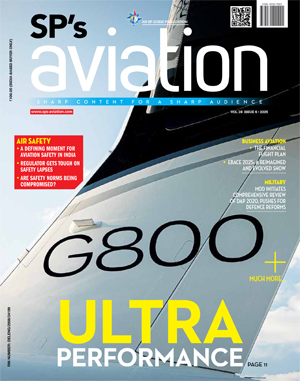INDIAN ARMED FORCES CHIEFS ON OUR RELENTLESS AND FOCUSED PUBLISHING EFFORTS

The insightful articles, inspiring narrations and analytical perspectives presented by the Editorial Team, establish an alluring connect with the reader. My compliments and best wishes to SP Guide Publications.

"Over the past 60 years, the growth of SP Guide Publications has mirrored the rising stature of Indian Navy. Its well-researched and informative magazines on Defence and Aerospace sector have served to shape an educated opinion of our military personnel, policy makers and the public alike. I wish SP's Publication team continued success, fair winds and following seas in all future endeavour!"

Since, its inception in 1964, SP Guide Publications has consistently demonstrated commitment to high-quality journalism in the aerospace and defence sectors, earning a well-deserved reputation as Asia's largest media house in this domain. I wish SP Guide Publications continued success in its pursuit of excellence.
- The layered Air Defence systems that worked superbly, the key element of Operation Sindoor
- Operation Sindoor | Day 2 DGMOs Briefing
- Operation Sindoor: Resolute yet Restrained
- India's Operation Sindoor Sends a Clear Message to Terror and the World – ‘ZERO TOLERANCE’
- Japan and India set forth a defence cooperation consultancy framework, talks on tank and jet engines
NBAA Condemns Disregard for Business Aviation’s Sustainability Leadership
NBAA Exposes Misleading Study Dismissing BA’s Sustainability Leadership while Defending Business Aviation’s Environmental Commitment and Economic Importance

The National Business Aviation Association (NBAA) has forcefully challenged a DC-based think tank’s study for promoting a misleading caricature of business aviation that ignores the sector’s sustainability leadership and the industry’s essential role in the nation’s economy and transportation system.
The report, released by the partisan, Washington, DC-based Institute for Policy Studies, omits key information about the game-changing innovations that continually lower the carbon footprint for business aviation, and overlooks independent survey data that provides a true representation of the industry as one comprised mostly of small and mid-size companies, flying largely to communities lacking airline service, typically with mid-level employees aboard.
The association said that included among the countless companies fitting this description are those like the Pullman, WA-based company that uses a business airplane to monitor key installations providing power to the region’s electric grid; the Minnesota-based frozen-food company that flies a turboprop aircraft to reach distribution centers in small towns across the US and the Phoenix, AZ-based medical company whose airplanes transport doctors to patients in isolated rural areas.
“Further, the report pointedly minimises the industry’s legacy of achievements in sustainable flight,” including lightweight composites, winglets and satellite-based avionics, as well as business aviation’s growing use of sustainable aviation fuels shown to reduce aviation carbon emissions by as much as 80 per cent – all of which are key to the industry’s goal of achieving net-zero emissions from business aircraft by 2050, NBAA said.
As a final deceptive claim, the study suggests dramatic hikes in costs for those relying on business aviation to operate in the nation’s air transportation system, looking past the reality – as noted by no less an authority than the International Civil Aviation Organisation (ICAO) – that the system’s costs are largely driven by the operations of commercial airlines, given the scale and complexity of the carriers’ hub-and-spoke operations. The Federal Aviation Administration (FAA) has long used the same economist-accepted cost-allocation methodology to reach the same conclusion.
“Unsurprisingly, the report provides none of this information, instead falling back on the tired practice of disparaging an entire industry to sound a predictable call for a raft of punitive taxes, fees and regulations disguised as ‘proposals,’” the Association noted. “Rather than being distracted by the overheated rhetoric the report offers in support of this agenda, NBAA urges an honest discussion of business aviation’s societal benefits and environmental leadership.”





